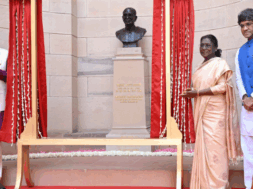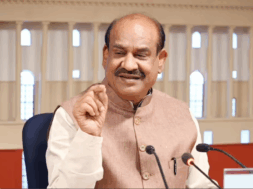
Manas Dasgupta
NEW DELHI, June 4: With the Hindi heartland of Uttar Pradesh seems to be ditching the BJP, the ruling party heading the NDA alliance is preparing to form the next government at the centre with a third consecutive term for the Prime Minister Narendra Modi, but for the first time he will have to depend on the mercy of his alliance partners to stay in power.
Falling way behind the target of 370 seats for the BJP on its own and 400 plus for the NDA, the ambitious goal set by Mr Modi before the elections, the BJP was struggling to cross 240, nearly 30 seats short of majority on its own but was saved by the new alliance partners, the Telegu Desam Party (TDP) in Andhra Pradesh and Janata Dal (United) of chief minister Nitish Kumar in Bihar whose joint tally is all set to push the NDA beyond 290 seats in the 543-member Lok Sabha. The opposition INDIA bloc led by the Congress, virtually written off in almost all the exit polls, was closing to 230 seats though was unlikely to come anywhere near the majority mark of 272 seats to form a government.
A see-saw battle between the NDA and the INDIA blocs began right from the beginning as the counting of votes for the Lok Sabha elections was taken up on Tuesday morning unlike a one-sided sweep as predicted in the exit polls. The counting, however, was going on very slowly almost in all the states and by 5 P.M. only about 35 results were declared of which the BJP had won in 24 seats, the Congress in seven, the JD(S) two and Shiv Sena (UBT) and AAP have won one seat each. Around 5 pm, the BJP is ahead on 241 seats, the NDA on 296. The INDIA bloc is ahead on 228 seats, the Congress on 100.
However, the Prime Minister Narendra Modi in Varanasi, the union home minister Amit Shah in Gandhinagar, defence minister Rajnath Singh in Lucknow, and Congress leader Rahul Gandhi in both Raebareli and Wayanad, and Samajwadi Party chief Akhilesh Yadav in Kannauj have already established almost unbeatable leads in their respective constituencies and are expected to be declared winners soon. Incidentally, the BJP lost the Faizabad seat in Uttar Pradesh, which include Ayodhya where the construction of the Ram Temple was used as a major achievement of the Modi government to win votes.
Even as a third term for Mr Modi appeared certain, the outcome may have substantially dent his pride as he will have to depend on the whims of Mr Chandrababu Naidu and Nitish Kumar to run his government. In both 2014 and 2019 elections, the BJP on its own had crossed the majority mark but had kept the NDA alliance partners with him though he was not dependent on them to stay in power.
The day apparently belonged to the resurgent Opposition, which performed way over the modest expectations raised by exit polls. The Congress, which Mr Modi had claimed would not even touch 50 to become a recognised opposition in the Lok Sabha is set to touch century mark while the Trinamool Congress in West Bengal and the Maha Vikas Aghadi (MVA) alliance of the Congress, Shiv Sena (UBT) and Nationalist Congress Party of Sharad Pawar in Maharashtra halted the BJP’s progress.
The ruling party has been badly let down by “Bulldozer-man” Yogi Adityanath’s UP which sends a whopping 80 legislators to the Lok Sabha, having pushed the INDIA bloc — Samajwadi Party and the Congress — ahead in more than 40 of its 80 seats at 3 pm. The BJP is in mid-thirties. The BJP had swept Uttar Pradesh in 2014 and held of its ground in 2019. This time most exit polls had predicted an edge for the party.
Two of the other battleground states have also not gone the BJP’s way. In Bengal, the party’s big hope, it could fare worse than 2019, leading in only 11 seats at 3 pm. Mamata Banerjee’s Trinamool Congress appears to have recovered much of the lost ground and is ahead in 31 seats.
Maharashtra appears to have made its disapproval clear of the political manoeuvrings in Shiv Sena and the Nationalist Congress Party. The Uddhav Thackeray faction is ahead on 11 seats to Shinde Sena’s 5. The Ajit Pawar faction of NCP is ahead on just one seat and his uncle Sharad Pawar on 7. The BJP and the Congress are neck on neck with 12 and 11 seats.
The BJP’s losses, as expected, are being offset from Odisha, Karnataka, Andhra Pradesh and to an extent, Telangana.
In Andhra Pradesh, Chandrababu Naidu is heading for a landslide victory, with a clear lead in 158 of 175 constituencies. Sources said the oath ceremony will be on June 9. In Odisha, the BJP is looking forward to ending the 25-year run of Naveen Patnaik’s Biju Janata Dal.
The campaign has been intense and drawn out, and the mood of the voters difficult to read in this election. Three exit polls have predicted a 400-plus score for the BJP-led NDA. The rest differ only in the margin of the NDA victory — conclusions the Opposition has trashed. Exit polls have always had mixed success in the country.
As with every election, the BJP unleashed its formidable election machinery early, and launched a star-studded campaign that focussed on development, economy and a vision for the 100-year anniversary of Independence. Backing it up were the promises met — the scrapping of Article 370 and the construction of the Ayodhya Ram temple.
The big difference was the Opposition’s offensive against the ruling coalition, a long way from the lack of cohesiveness of 2019. While the beginning was shaky and in parts, patchy — like the Congress versus Trinamool contest in Bengal and Congress versus AAP in Punjab — the narrative on a change in constitution and scrapping of reservation made an impact.














